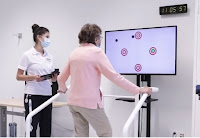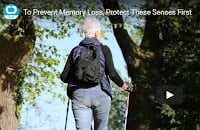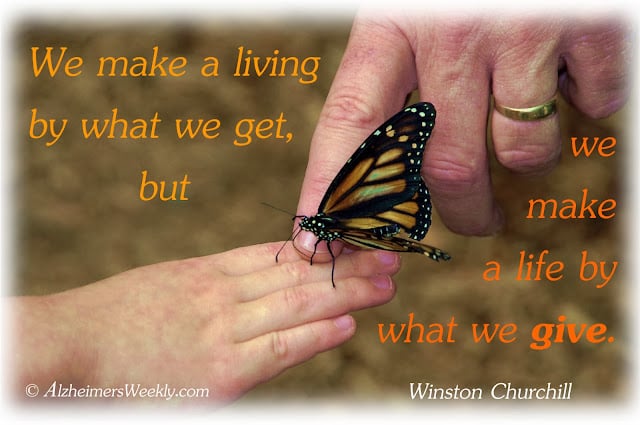
Clutter Can Be Helpful in Dementia
Researchers have found that a clutter-free environment may not be helpful to people with dementia — in fact, people with moderate dementia appeared to do better when surrounded by their usual clutter. Learn more.

Researchers have found that a clutter-free environment may not be helpful to people with dementia — in fact, people with moderate dementia appeared to do better when surrounded by their usual clutter. Learn more.

An international team of researchers finds that cognitive motor training helps fight Alzheimer’s and dementia, using a fitness game to show that cognitive motor training improves both cognitive and physical skills in people with significant dementia. Find out more.

67-year-old Steve Goodwin refuses to let Alzheimer’s steal his music. Though he can no longer play the beautiful songs he composed for his wife, see him rescue their music with the help of a fantastic friend and professional pianist.

People with Alzheimer’s often need more time and preparation to dress. It’s important to allow the person to dress on his or her own for as long as possible. Here are some tips.

FORGOT where you put those keys again? Worried about it? The good news is, though you may have a problem, it’s probably not Alzheimer’s. A real warning sign of Alzheimer’s is “anosognosia”. That’s when you forget and are not aware of it, while other people are. Learn more about what causes memory problems and how to better understand what you see.

See how hearing aids and cataract surgery slow memory loss and fight cognitive decline. Learn what vision & hearing interventions can do to fight dementia.

Researchers know that some elderly patients have problems with cognitive function for weeks, sometimes months, following surgical procedures. Find out what the research reveals about this connection.

A global team of scientists has found by tracking the health of more than 31,000 adults through six longitudinal studies that treating high blood pressure with medication reduces the risk of dementia by 12 percent. It reduces the risk of developing Alzheimer’s disease even more – by 16 percent. Find out why.

Researchers in Canada find that listening to one’s favorite music, or to music that is personally significant, leads to improvement in the integrity of the brain.

A regular afternoon nap seemed to be associated with better cognitive performance in a study of healthy seniors living in China.

Easy golfing is great for people with dementia. It offers opportunities to socialize and be active, without memory or athletic constraints. See how one club integrated golf into the routine of a family living with dementia. Learn about an easy-to-set-up indoor/outdoor home golfing kit.

Discover how CAPSLL’s personalized interview experiences help families capture and preserve the cherished stories of loved ones facing Alzheimer’s and dementia, ensuring their legacies endure for future generations.

DIET VIDEO + ARTICLE: Walnuts fight Alzheimer’s in a big way in the lab. Learn how walnuts appear to have a beneficial effect in reducing risk, delaying onset, slowing progression and preventing Alzheimer’s.

SHORT-TERM MEMORY lapses are obvious signs of Alzheimer’s, but other tell-tale signals begin to show much earlier. Learn how to look for semantic impairments, such as simple questions about size.

Three important dementia studies focus on HS-AGING, a type of dementia almost as common as Alzheimer’s in the 85+ group. Yet few people have heard of it. Why? What makes it different?

An intriguing study of 120 grandmothers might surprise you. Doctors know socially engaged people have better cognition and less dementia. But can a person get too much of a good thing? What’s the right balance?

Enjoy this great duet between a musician with dementia and his son. A triumph of spirit over Alzheimer’s! Sing-a-long if you like!
No spam, only news and updates.



This site was inspired by my Mom’s autoimmune dementia.
It is a place where we separate out the wheat from the chafe, the important articles & videos from each week’s river of news. Google gets a new post on Alzheimer’s or dementia every 7 minutes. That can overwhelm anyone looking for help. This site filters out, focuses on and offers only the best information. It has helped hundreds of thousands of people since it debuted in 2007. Thanks to our many subscribers for your supportive feedback.
The site is dedicated to all those preserving the dignity of the community of people living with dementia.
Peter Berger, Editor